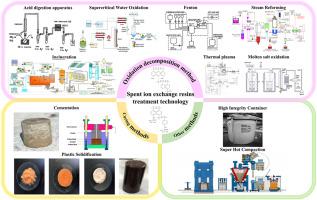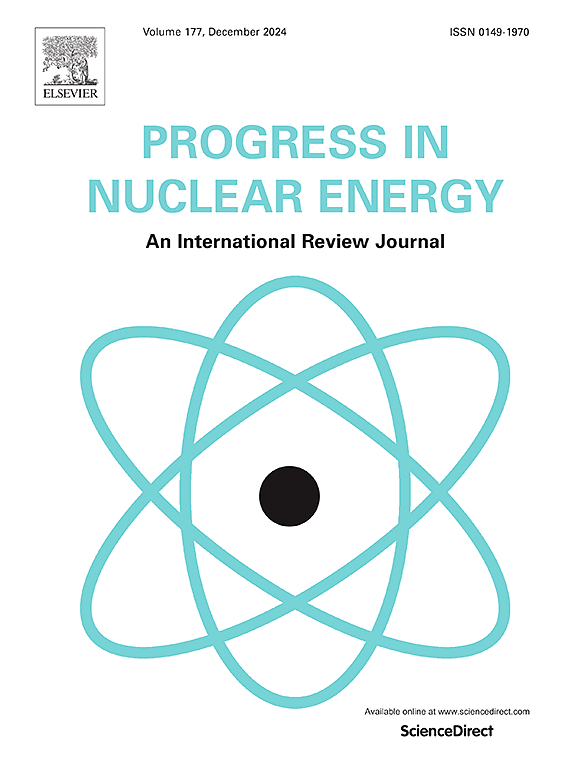Revolutionizing radioactive waste resin treatment: A comprehensive review of advanced technologies and future directions
IF 3.2
3区 工程技术
Q1 NUCLEAR SCIENCE & TECHNOLOGY
引用次数: 0
Abstract
Nuclear-grade ion exchange resins are essential for managing the water chemistry within the primary circuit of nuclear power plants. Once these resins have reached the end of their useful life, they are typically not regenerated, and their disposal presents a significant challenge due to radioactive contamination. Spent ion exchange resins represent a substantial portion of low- and intermediate-level radioactive solid waste generated during the decommissioning of nuclear facilities. Various treatment methods have been developed to address this waste, which can be broadly classified into oxidation decomposition methods and non-oxidation decomposition methods. Oxidative decomposition approaches include acid digestion, supercritical water oxidation, Fenton processes, steam reforming, incineration, pyrolysis and gasification plasma treatment, and molten salt oxidation. Conversely, non-oxidation decomposition methods encompass cementation, bituminization, plastic solidification, vitrification, hot Super Compression, high Integrity Container. This paper reviews the fundamental principles underlying these treatment methodologies along with recent research advancements while discussing their respective advantages and limitations. The emphasis is placed on the process flow and processing capacity of various methods in practical applications.

革命性的放射性废物树脂处理:先进技术和未来发展方向的综合综述
核级离子交换树脂在核电厂一次回路的水化学管理中是必不可少的。一旦这些树脂达到其使用寿命的终点,它们通常不会再生,并且由于放射性污染,它们的处理提出了一个重大挑战。废离子交换树脂占核设施退役期间产生的低、中水平放射性固体废物的很大一部分。各种处理方法已被开发出来,大致可分为氧化分解法和非氧化分解法。氧化分解方法包括酸消化、超临界水氧化、芬顿法、蒸汽重整、焚烧、热解和气化等离子体处理以及熔盐氧化。相反,非氧化分解方法包括胶结、沥青化、塑料固化、玻璃化、热超压缩、高完整性容器。本文回顾了这些治疗方法的基本原理以及最近的研究进展,同时讨论了它们各自的优点和局限性。重点介绍了各种方法在实际应用中的工艺流程和处理能力。
本文章由计算机程序翻译,如有差异,请以英文原文为准。
求助全文
约1分钟内获得全文
求助全文
来源期刊

Progress in Nuclear Energy
工程技术-核科学技术
CiteScore
5.30
自引率
14.80%
发文量
331
审稿时长
3.5 months
期刊介绍:
Progress in Nuclear Energy is an international review journal covering all aspects of nuclear science and engineering. In keeping with the maturity of nuclear power, articles on safety, siting and environmental problems are encouraged, as are those associated with economics and fuel management. However, basic physics and engineering will remain an important aspect of the editorial policy. Articles published are either of a review nature or present new material in more depth. They are aimed at researchers and technically-oriented managers working in the nuclear energy field.
Please note the following:
1) PNE seeks high quality research papers which are medium to long in length. Short research papers should be submitted to the journal Annals in Nuclear Energy.
2) PNE reserves the right to reject papers which are based solely on routine application of computer codes used to produce reactor designs or explain existing reactor phenomena. Such papers, although worthy, are best left as laboratory reports whereas Progress in Nuclear Energy seeks papers of originality, which are archival in nature, in the fields of mathematical and experimental nuclear technology, including fission, fusion (blanket physics, radiation damage), safety, materials aspects, economics, etc.
3) Review papers, which may occasionally be invited, are particularly sought by the journal in these fields.
 求助内容:
求助内容: 应助结果提醒方式:
应助结果提醒方式:


